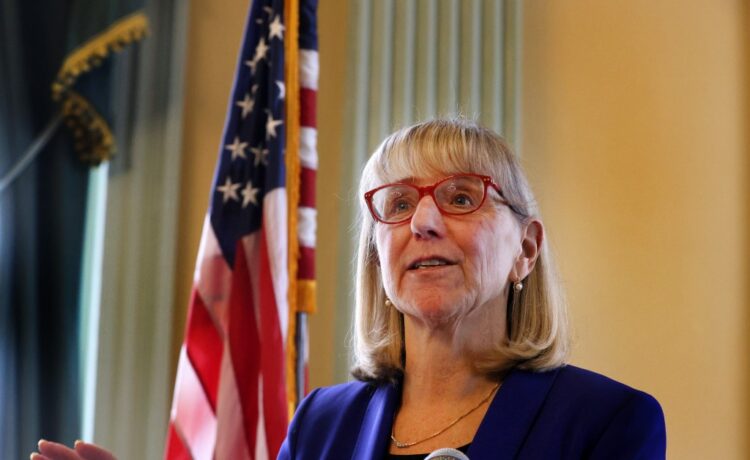Senate President Karen Spilka says the state needs to push forward with bold plans despite revenue concerns or migrant shelter costs. (Nancy Lane/Boston Herald)
Despite a shifting revenue landscape, now is not the time to let up on the investments that make Massachusetts the right place to be for the families that choose to live here, according to the Senate President.
Speaking to the Greater Boston Chamber of Commerce for their semi-regular Government Affairs Forum, Senate President Karen Spilka delivered a wide ranging speech Monday, in which she acknowledged that the state’s financial future is starting to look murky amid falling revenues and the cost of housing thousands of migrant families. But those pressures are not an excuse to halt efforts to improve into education at all levels, fund affordable childcare, or tackle youth criminal justice reform, she said.
“I would argue that now is not the time to pull back on the critical investments that have been—and will continue to be—beacons of hope and opportunity for our residents. Because Massachusetts cannot thrive without a well-educated, well-trained workforce. And those workers cannot thrive without sustainable, family-supporting jobs, the ability to afford a house, pay for childcare, and have access to the incredible health care and other quality of life benefits we have here,” Spilka said.
Spilka’s comments come as the upper chamber gets ready to take up debate on the fiscal 2025 state budget, which is currently under consideration in the House. Just two years ago the state was flush with cash — so much so, it had to send some back to taxpayers — but revenues have come in under benchmark for most of 2024, causing some alarm among budget writers and policy wonks.
Despite that, Spilka said, this year’s senate budget will include a plan to provide free community college to all students, including the cost of tuition, fees, books and supplies.
“Our goal of providing free community college to every resident has generated a lot of discussion—and I welcome that dialogue. But the fact remains that, if we want a generation of students to benefit from the terrific programs at our many community colleges across the state, we must remove as many barriers to entry as possible. Free is a lot easier to understand than: it will be free for you if you have the time, support of adults, and language capabilities needed to fill out these many complicated forms,” she said.
Senate lawmakers will also address the need to keep for the state’s childcare centers open, Spilka said, by making the Commonwealth Cares for Children grants formerly funded by the federal government a part of the fiscal 2025 budget. The House budget and the spending proposal offered by Gov. Maura Healey earlier this year also included such a provision.
The Senate will also fund a pilot program aimed at getting businesses invested in the childcare needs of their employees, Spilka said. Businesses that establish their own childcare centers could see 50-50 matching grants under the program, she said.
“This pilot program, which we included in our bill and will fund in our upcoming budget, is equitable by design, and parameters are in place to help guarantee good paying jobs and support families with lower incomes. I’ve said it before, and I’ll say it again – we cannot tackle our childcare challenges alone. We know this issue is a priority for so many of you, and we look forward to working with you to make it a model for public private partnership,” she said.
Spilka also spoke about the “Raise the Age Act,” a plan to raise the legal age of adult consequence to 19. According to the Senate President, that proposal represents an “opportunity to provide opportunity.” Almost every 18-year-old high school student makes some serious mistakes, Spilka said, but for some the results can be truly life altering.
“For many of us, those mistakes didn’t stop us from having the chance to fall in love, start and nurture a family, take out a loan for an education, buy a house or car, or develop a calling and a career that we love and live for. It is unjust that some young people—by virtue of geography, race, ethnicity or family background—will be robbed of opportunities to create a life full of meaning and happiness because of an early entanglement with the criminal legal system,” she said.
Budget debate will begin in the House this Wednesday, and the Senate will begin budget negotiations in May. A final product is theoretically due by the end of June, though the Legislature hasn’t delivered an on-time budget through any of the last 13 fiscal years.

















